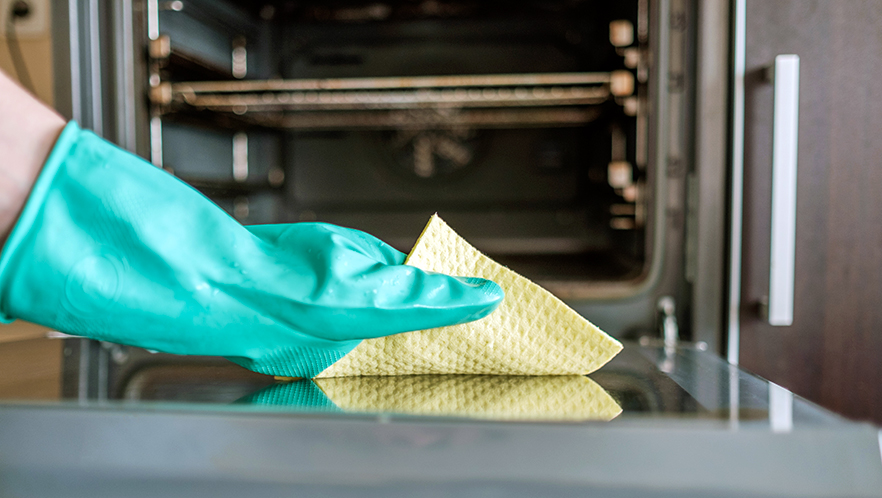Maintaining household appliances can be a chore, but avoiding or delaying basic upkeep can cause major headaches.
Geek Squad’s appliance repair Agents frequently encounter costly situations that could have been avoided with routine cleaning and maintenance.
To help you keep your appliances looking, working and smelling like new, we’ve gathered some tips and tricks from Agent Dustin Williams.
From the kitchen to the laundry room, here’s how you can maintain some of the most commonly used household appliances.
Dishwashers
“With most appliances, prevention is the best care,” Dustin said. “It may be common sense, but always rinse food off dishes before putting them in the dishwasher to keep the chute from clogging.”
When it’s time to clean your dishwasher, empty it out, and start the highest temperature setting. Once the basin starts to fill, drop in one cup of white vinegar to break up soap residue, clean out the pumps and dissolve food particles.
Washing machines
Using too much detergent is the number one reason Geek Squad makes repairs on front-load washers. Generally, one or two tablespoons will suffice, but consult the owners’ manual for specific instructions.
Whether you use a front- or top-loading washer, once per month, drain excess water from it when it’s turned off by opening the nozzle which may be found on the front or back of the machine (use a bucket to catch the water!). This helps your clothes get the best wash possible.
So, what about that musty smell that won’t go away? Empty the washer, drop in one liter of white vinegar, run a hot water cycle and leave the door open when it’s not in use to dry out the machine.
Dryers
Clogged vents cause most dryer failures. Along with emptying the filter after each load, clean out the dryer vent line at least once a year with an extendable vent brush wand.
Garbage Disposals
It’s amazing how much food waste a garbage disposal can get rid of, but the smell that’s sometimes left behind isn’t welcome. “Once per month, simply drop in half of an orange, lemon or tangerine and run the disposal to help eliminate bad smells,” Dustin said.
Cooktops
Cooktops come in different formats, including electric, gas, glass or ceramic, and induction. When it comes to care, each has its nuances.
- Electric: Once per month, soak the burners in soapy water and avoid cleaning them with abrasive cleaners (like SOS pads) to reduce the risk surface scratches.
- Gas: Clean burners regularly with an old toothbrush to avoid hindering gas flow with food debris and other buildup (make sure the burners are off and cool, of course!).
- Glass/Ceramic (Electric or Induction): When the cooktop is off (and cool), use glass or ceramic cooktop cleaner and a scratch-free sponge to remove food debris and other buildup. Depending on how dirty the cooktop gets when you cook, you might want to do this after each use.
Microwaves
“When Geek Squad gets asked for microwave help, it’s usually because someone didn’t use the right kind of container when microwaving,” Dustin said. “Always make sure what you’re putting into the microwave is microwavable.”
Using the right kind of container is essential, and the same goes for cleaning products. When cleaning, just microwave a half-cup of water for two minutes then use a warm, damp cloth to wipe the inside clean.
Last but not least, pay attention to the microwave’s door. If it isn’t closing properly, don’t use the microwave and call a professional to evaluate it immediately.
Ovens
One way to have a clean oven is by taking preventative measures, but never lay foil on the bottom because it could ruin the oven’s liner. Instead, catch drips by placing a foil-covered pan on the bottom rack.
Clean a dirty oven by using the cleaning cycle and wiping it out once the cycle is complete (and the oven is cool). Always remove the racks when using the cleaning cycle, even if the manufacturer says you don’t have to, because the high temperatures could permanently stain them.
If your oven has tough stains that won’t go away, use oven cleaner plus steam from a boiling pot of water to get hard to reach areas.
Refrigerators
One of the most important things you can do to maintain your refrigerator is clean the water filter on a regular basis to avoid bacteria buildup in water pipes. “If your water doesn’t smell or taste right, it’s time to change the filter,” Dustin said.
You’ll also want to dump out the freezer’s ice bucket to prevent ice cubes from fusing together. Fused ice can damage the ice bin and dispenser. So, if it’s been more than week since you’ve used the dispenser, dump out the bin.
Finally, clean the gaskets (the rubber lining that surrounds refrigerator and freezer doors to keep them tightly closed) with soap and water at least once a month. Food and drink spills can damage gaskets and ultimately destroy them, which could lead to leaks onto your floor, or worse – spoiled food (gross).
To learn more about household appliances and how to care for them, visit your nearest Best Buy store and talk to one of our knowledgeable Blue Shirts. And our expert Geek Squad Agents are always standing buy to help fix broken appliances.


